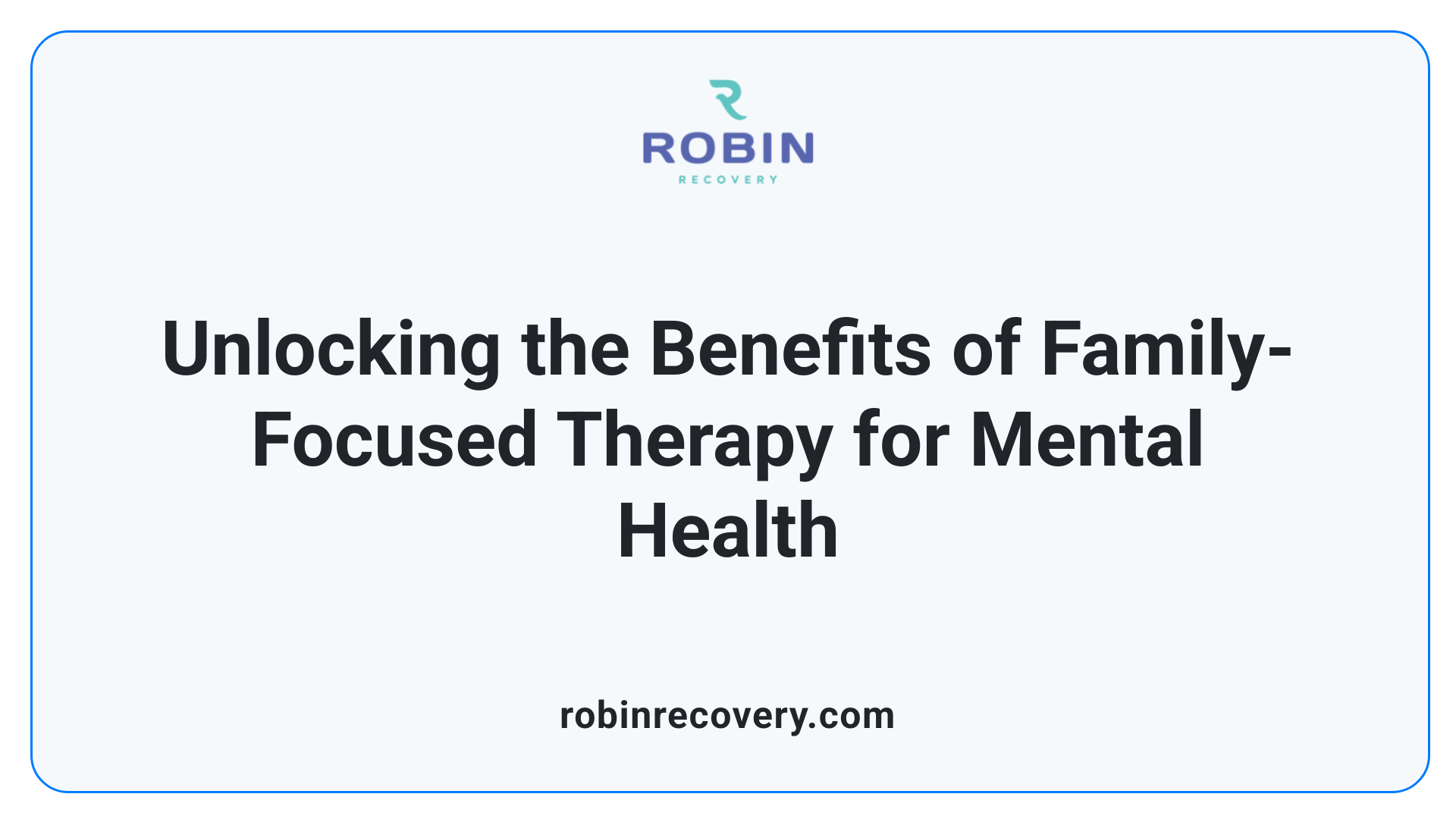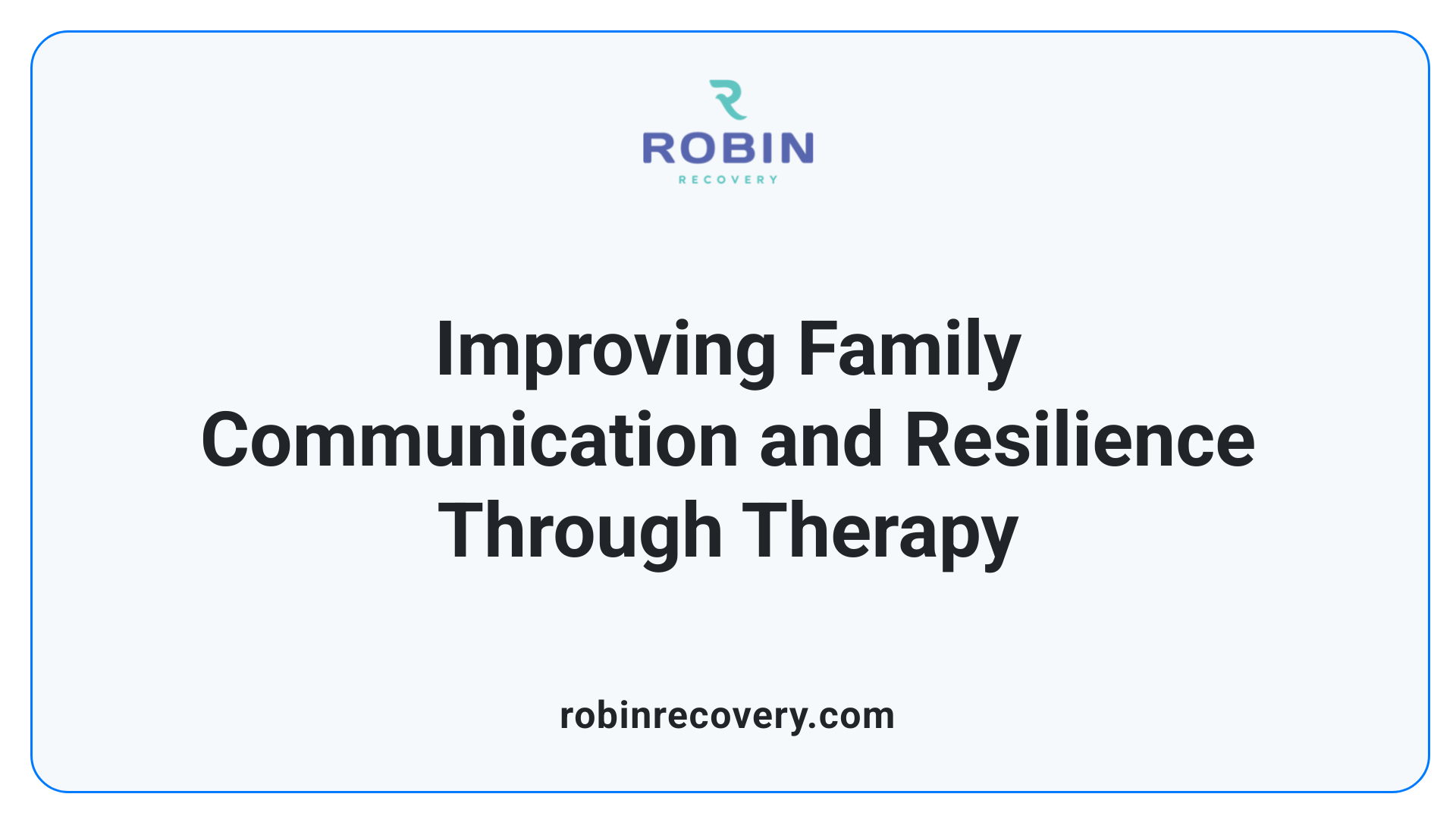The Benefits of Family Therapy in Strengthening Support Systems

Understanding Family Therapy
Family therapy is an intervention that focuses on enhancing communication, resolving conflicts, and strengthening relationships within family units. By viewing the family as a system, therapists help identify and modify dysfunctional dynamics, ultimately promoting resilience and a healthier emotional environment. This article delves into the various benefits family therapy offers in bolstering support systems and improving mental health among families.
The Foundations of Family Systems Therapy

What is family systems therapy and what benefits does it offer?
Family systems therapy, developed by psychiatrist Murray Bowen, focuses on the relationships within families, viewing them as emotional units rather than individual entities. This approach recognizes that changes in one member can influence the entire family dynamic. By employing concepts such as triangles, which represent the smallest stable relationship systems, and differentiation of self, which refers to maintaining an individual's identity while fostering connections, family systems therapy reshapes how families interact.
The benefits of family systems therapy are extensive. This therapeutic approach strengthens connections, improves communication, and resolves conflicts, creating healthier relational dynamics within the family. It is effective for addressing a variety of issues, including behavioral problems, substance use disorders, and emotional challenges that impact multiple members. Additionally, family systems therapy is flexible and culturally sensitive, making it suitable for diverse populations and family structures.
Families engaging in this therapy often experience:
- Enhanced communication: Members learn to express thoughts and emotions in constructive ways.
- Problem-solving skills: Families tackle conflicts collaboratively, improving decision-making processes.
- Strengthened relationships: The therapy nurtures emotional bonds, fostering trust and respect among members.
In summary, family systems therapy is a holistic approach that promotes not just individual healing but strengthens the entire family unit, proving beneficial for both emotional and mental health.
Advantages of Family-Focused Therapy

What are the benefits of family-focused therapy?
Family-focused therapy (FFT) provides a myriad of advantages that significantly improve familial interactions and support systems. Firstly, it enhances communication skills, enabling family members to express feelings constructively and without judgment. This establishes a healthier dialogue that strengthens relationships overall.
Moreover, FFT is beneficial for families dealing with mental health challenges. By pulling families into the therapeutic process, it encourages collective participation and understanding. Through psychoeducation, families learn about conditions like bipolar disorder and schizophrenia. This wealth of knowledge allows them to provide better support, reducing the likelihood of relapse among affected individuals.
Impact on mental health conditions
FFT has a tangible positive impact on various mental health conditions. Families involved in the treatment process often show improved outcomes in managing mental health disorders. Structured family therapy meets about 21 sessions over 9 months, focusing on collaborative techniques that empower families to understand and tackle challenges together. This teamwork not only fosters resilience but also creates a solid support network when crises arise.
Typical therapies and outcomes
In terms of therapy methods, family-centric approaches can range from psychoeducational strategies to dynamic interactions aimed at developing healthy boundaries. The outcomes are profound; families often report decreased conflict and emotional strain. The nurturing environment created through FFT equips family members with problem-solving tools and improves their collective emotional well-being.
In summary, involving families in treatment not only aids the individual suffering from mental illness but also enhances the family's resilience and understanding of these challenges, fortifying the familial bond for better mental health management.
Pros and Cons of Family Therapy

What are the advantages and disadvantages of family therapy?
Family therapy offers several notable advantages that can profoundly benefit family dynamics. Among these are improvements in communication, where families learn to express thoughts and emotions without blame. This helps reduce misunderstandings and fosters a more supportive atmosphere. Enhanced conflict resolution skills are another gain; therapy teaches families to navigate disagreements in a constructive way, focusing on underlying issues rather than on blame. Lastly, it strengthens family bonds through shared experiences and emotional validation, ultimately reinforcing relationships.
However, family therapy does come with potential challenges and limitations. For instance, it often requires significant time and financial commitments, which can be daunting for families. Resistance from some family members can also pose an obstacle; if not everyone is committed to the process, the therapy's effectiveness may decrease. Additionally, as underlying emotional issues are uncovered, this can lead to increased stress and conflict in the short term as families navigate the painful aspects of their history.
Conditions for successful therapy
Successful family therapy is contingent on the participation of all family members. Uneven engagement can lead to skewed dynamics and undermine the effectiveness of the therapeutic process. A supportive environment where open communication is encouraged is essential for addressing issues constructively. Overall, while family therapy can promote healthier relationships, its success largely depends on the willingness of all members to participate actively.
Exploring Structural Family Therapy

What is Structural Family Therapy?
Structural Family Therapy (SFT) is a therapeutic approach developed by Salvador Minuchin, emphasizing the relationships and interactions within family units. This therapy addresses dysfunctional dynamics that may contribute to emotional and psychological issues. By enhancing communication and establishing healthier structures, SFT aims to create balance within families, which leads to improved emotional connections and better functioning overall.
Principles and Goals of Structural Family Therapy
The primary goal of Structural Family Therapy is to identify and modify problematic family structures. The therapy works to:
- Enhance Communication: Facilitate open discussions that reduce misunderstandings.
- Establish Healthy Boundaries: Differentiate roles within the family to prevent enmeshment and promote individual autonomy.
- Improve Emotional Connections: Foster empathy and support among family members.These principles ultimately guide families towards a more cohesive and supportive environment.
Techniques Used in the Approach
SFT employs various techniques to help reframe family interactions, including:
Technique Description Purpose Family Mapping Visual representation of family dynamics and relationships. To clarify roles and interactions. Joining The therapist establishes rapport with family members, integrating into their interactions. To build trust and collaboration. Boundary-Making Altering boundaries between family subsystems to create healthier separations. To enhance individual identities. Enactment Families act out scenarios to explore and change dysfunctional behaviors. To facilitate awareness and change.
Situations Where Structural Family Therapy is Effective
Structural Family Therapy is particularly beneficial in various challenging scenarios, such as:
- Trauma: Helping families cope with the aftermath and adjust to new dynamics.
- Divorce: Assisting families in navigating emotional turmoil and restructuring relationships.
- Mental Health Challenges: Supporting families dealing with an individual's mental illness by promoting collaboration and understanding.By utilizing these techniques, SFT fosters resilience among family members, enhancing their capacity to support one another through difficulties.
Key Techniques in Family Systems Therapy
What techniques are used in family systems therapy?
Family systems therapy employs various techniques designed to enhance family dynamics and address issues effectively. Here are some of the most prominent methods utilized:
- Genograms: This technique visually maps out family relationships, highlighting patterns, dynamics, and generational influences. It helps identify emotional connections and areas needing attention.
- Family Sculpting: Members position themselves physically to demonstrate their perceptions of family relationships. This technique brings awareness to relational dynamics and feelings toward each other.
- Circular Questioning: This method encourages dialogue among family members by asking questions that invite members to share their perspectives. It fosters understanding and reveals different viewpoints within the family.
- Reframing: Therapists help family members view their situations and interactions from different angles, promoting a better understanding of underlying issues and reducing blame.
- Boundary Making: Establishing healthy boundaries within family relationships promotes respect and clarity, reducing conflict and enabling each member to contribute positively.
- Detriangulation: This technique encourages direct communication, reducing reliance on third parties to resolve disputes, promoting healthier interaction between primary members.
- Enactments: Role-playing specific family interactions allows members to observe their behaviors and dynamics in a safe environment, facilitating discussion and reflection.
Overall, these techniques aim to improve communication, resolve conflicts, and foster healthier relationships within the family unit. The flexibility of these methods allows family therapists to tailor interventions to suit the unique needs of each family.
Emphasizing Communication and Conflict Resolution

Improving Communication Through Therapy
Family therapy plays a vital role in enhancing communication among family members. By creating a safe and structured environment, therapists encourage open dialogue that reduces misunderstandings. Family members learn to openly express their feelings and needs without fear of judgment, which lays the groundwork for healthier interactions.
Conflict Resolution Techniques in Therapy
Therapeutic sessions introduce families to effective conflict resolution techniques. Families learn to identify underlying issues rather than merely focusing on surface-level conflicts. Communication strategies such as reflective listening—where family members actively listen and paraphrase what they heard—help minimize defensive reactions. Instead of assigning blame, therapy fosters empathetic engagement, encouraging family members to collaborate in resolving disputes constructively.
Benefits for Family Relationships
The benefits of improved communication and conflict resolution extend far beyond immediate disagreements. Families who engage in therapy often experience strengthened relationships, characterized by greater empathy and understanding. By addressing patterns of interaction and offering tools for effective dialogue, therapy helps families navigate future challenges with cohesion. As they practice these skills, family members report increased emotional connection and a supportive atmosphere at home, which is crucial for overall mental well-being.
Fostering Emotional Support and Resilience
Building emotional support systems
Family therapy plays a crucial role in nurturing emotional support systems within the family unit. By creating a safe environment for discussions, family members are encouraged to share their feelings and perspectives openly. This openness fosters empathy, allowing each member to feel valued and understood, crucial for emotional health.
Enhancing family resilience during challenges
Therapy equips families with strategies to navigate life's challenges, such as illness, loss, or parental conflicts. Through family therapy, participants learn to communicate effectively and work collaboratively, which strengthens resilience. For instance, families facing divorce are guided to express their fears and hopes, transforming distress into unity and support.
Tools for coping with emotional stress
Family therapy introduces various tools for managing emotional stress. Techniques like active listening and assertive communication help family members express their emotions constructively. Additionally, family interventions teach boundaries that encourage healthy relationships, enabling families to mitigate conflicts and promote understanding.
By addressing emotional challenges together, families enhance their collective resilience, fostering a supportive environment that aids in coping with both present and future adversities.
Addressing Common Family Challenges
Therapy's Role in Navigating Family Issues
Family therapy offers a vital support system for families facing a variety of challenges. From communication breakdowns to conflicts arising from significant life changes like divorce or chronic illness, therapists help families explore their relational dynamics. By focusing on enhancing communication and resolving conflicts, therapy enables families to tackle underlying issues collaboratively. This collective approach is invaluable in promoting mutual support and understanding among family members.
Support for Families Dealing with Change
Therapy provides crucial emotional support for families grappling with transitions. Whether it's adapting to a new family structure or dealing with the grief of loss, family therapy equips members with tools to navigate these difficult times. The therapist fosters a safe environment where feelings can be expressed openly, helping families process their experiences together and build resilience against future challenges.
Enhancing Coping Mechanisms Through Therapy
One significant benefit of family therapy is its focus on developing effective coping strategies. In a supportive environment, families learn to manage stress and tackle issues as a united front. Techniques such as active listening and assertive communication are emphasized, enhancing understanding and empathy among members. This collaborative mindset not only improves relationships but also strengthens the family unit's resilience, enabling them to face life's hurdles with confidence.
IssueTherapy's ApproachBenefit Communication Issues Promote open dialogue Reduces misunderstandings and conflicts Family Transitions Address emotional impacts Fosters resilience and adaptability Coping Mechanisms Teach effective strategies Enhances family support and unity
The Lasting Impact of Family Therapy
Family therapy plays a vital role in strengthening family support systems, promoting healthier communication, and resolving conflicts in familial relationships. By addressing systemic issues and fostering deeper emotional connections, therapy cultivates resilience and empowers families to support each other through various challenges. The approach is versatile, adapting to the unique needs of diverse family structures while enhancing overall well-being. While it requires commitment and cooperation from all members, the lasting benefits of strengthened support systems and improved mental health make family therapy an invaluable tool for establishing harmony and understanding within families.
References
- The Benefits of Family Therapy: Strengthening Bonds and Improving ...
- Benefits of Family Counseling and How It Works - MedicalNewsToday
- The Benefits of Family Therapy: Strengthening Bonds and Building ...
- Family Interventions: Basic Principles and Techniques - PMC
- Advantages and Disadvantages of Family Therapy
- The Benefits of Family Therapy: Strengthening Relationships and ...
- Unveiling the Benefits of Family Therapy
